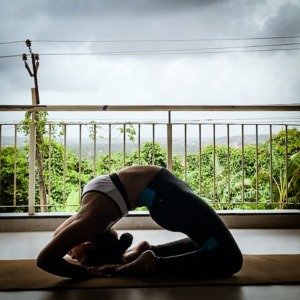
Yoga not only helps us lead happy, healthier lives but also leads us to understand ourselves better- says Shanice Sousa Pereira
In a world full of deadlines, responsibilities, and chaotic traffic, it is no wonder we find ourselves in dire need of some Zen. Enter yoga- the art of contorting your body into pretzel-like postures, with the promise of finding inner peace and harmony. 
Contrary to common belief, yoga is not a practice for just the calm and easygoing folk; it’s for those with the busiest lives, packed schedules and a million things on their to-do lists. We all find ourselves trying to pack in our days with productivity, but time for yoga should be at the top of our lists, marked as ‘a priority.’ Why, you ask?
Yoga has a list of benefits for just about everyone, and that list is long. Once you get into a routine of yoga practice, you will find that your body starts going through small changes. Your flexibility improves, you start building strength, you will have better posture, and even your endurance may increase. Along with the changes in your body, you will experience calmness of mind. The combination of movement with conscious breath helps regulate the nervous system and in turn assists in stress management. If you look beyond this, with continued practice, you will notice the effect it has on your sleep, respiration, and even digestion. 
This sounds like yoga is the magic fix-it pill we are all looking for to improve our health and state of mind- and it could be! All one has to do is start a consistent practice. In the beginning you could be practising a couple of minutes a day and with time you can build up to a full routine that suits your needs. Everyone goes at their own pace and it’s crucial for you to listen to your body and push only within your limit. For some, three classes a week may be manageable, for others a daily practice may feel right. The key to accessing all the benefits of yoga is consistency. Not drastic unsustainable changes, but small steps that will go a long way.
Headstands, balancing poses and the splits may be some of the things that come to your mind when you think of yoga. And that is not wrong! The asanas are a very important part but there’s much more to it than just being flexible. The process and the mindset are crucial too. 
Once you decide to venture into the world of yoga you first realise how connected the body is to the breath. It does not matter what style of yoga you choose to practice, some fundamentals stay the same; the most important one of them all being our breath. Breathing is an involuntary function that is within our control. It is the awareness of the breath during the practice which forms the essence of a yoga practice. When we move with our breath we experience conscious breathing which has a lot of mental benefits.
You also concentrate on all the aspects of your breath, like the rate, depth, or movement of breath. This focus on your breathing brings you into the present moment. Think about these aspects of your breath when you are stressed versus when you are calm. The difference in breathing goes to show that our breath is also connected to our minds. If you have ever pondered the connection between the mind and the body, the breath may give you some answers.
This brings us to the practice of meditation. For a lot of people, meditation can seems like a waste of time. It is anything but that. It helps us to be more mindful of our emotions and allows us to be an observer of our thoughts. It introduces a sense of much needed clarity in our usually tumultuous minds. “The inspiration you seek is already inside you, be silent and listen” – Rumi.
For a beginner, meditation may be a little frustrating. The goal of meditation is not to control your mind or your thoughts. It is to simply allow the thoughts to come and go, much like watching clouds in the sky. You allow them to pass without attachment or judgment and drift away to reveal the expansive sky of awareness. With meditation the effort is actually inversely proportional to the result! The harder you try and concentrate, the more thoughts pop up into your head. Here is where the breath helps you out. Focusing on your breath serves as an anchor for the mind; a steady, constant process that allows you to re-centre. Every time you find your mind drifting away, gently bring it back to observing your natural breath. There are various types of meditation practices but they all bring your mind into the present moment and help take a break from the constant and sometimes unnecessary distractions around us.
As you begin to explore the different facets of yoga, you start becoming more aware of your body, mind, and even emotions. Over time you will see how the various concepts you learn from your yoga practice can be incorporated into your daily life. Just as we watch our thoughts during a meditation, we learn to be observers of our emotions without any attachment to them. This helps fortify your mind and builds a lot of resilience.
Yoga is so much more than just postures or breath-work or meditation. Yoga is a journey which takes us inwards, gives us the tools to understand ourselves better, and live healthier, happier lives.





